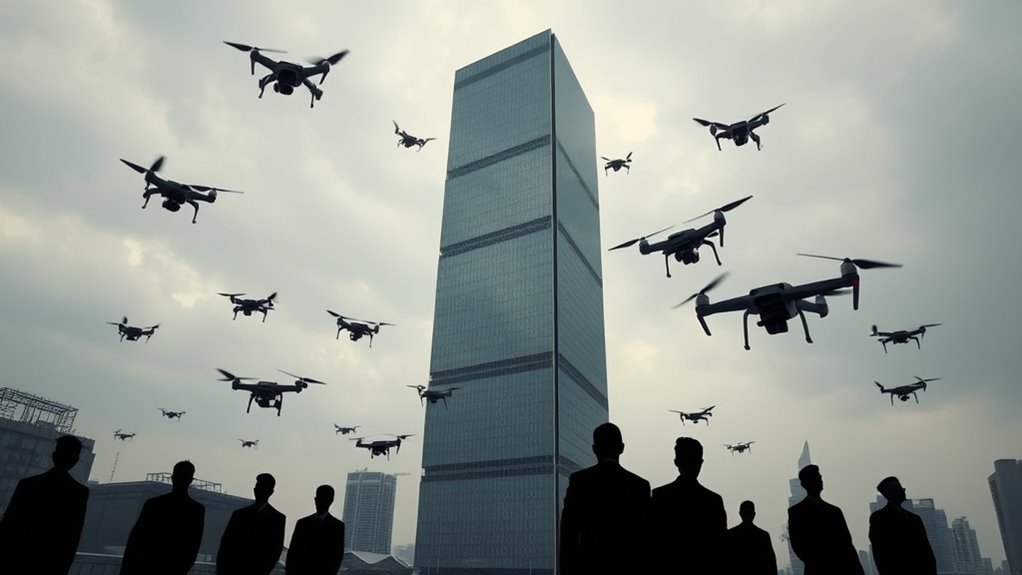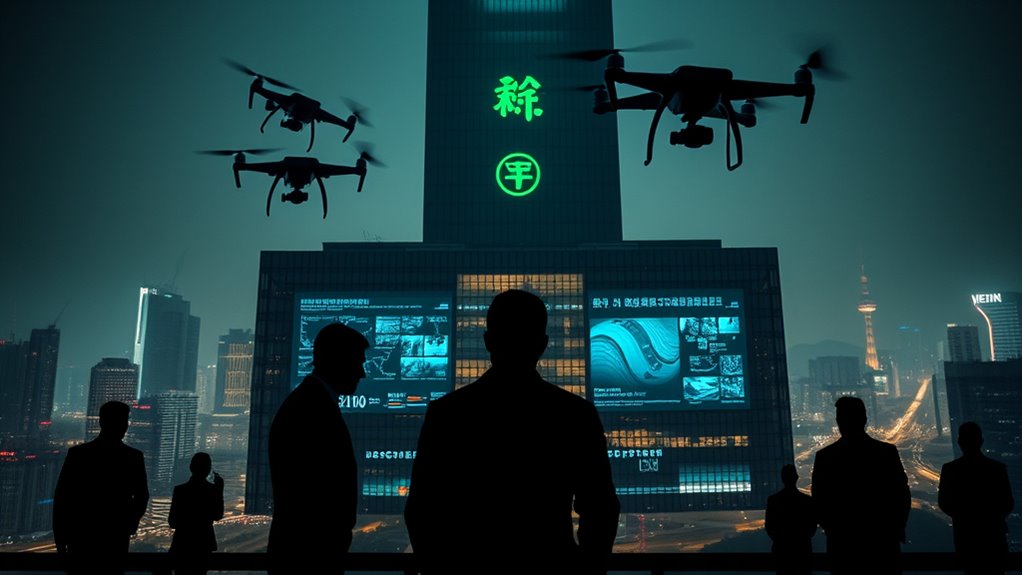China's Ministry of State Security (MSS) harnesses artificial intelligence to boost its intelligence gathering and domestic surveillance. Established in 1983, it's focused on counterintelligence and political security, employing around 800,000 personnel. The MSS conducts sophisticated cyber espionage, targeting sectors vital to national interests, and operates under a legal framework that allows extensive powers. As it navigates AI's rapid integration, it faces challenges and opportunities ahead. You might discover even more about its evolving strategies.
Key Takeaways
- The Ministry of State Security (MSS) focuses on intelligence gathering and counterintelligence, with a significant emphasis on economic espionage.
- Under Xi Jinping, the MSS has expanded its influence and personnel, now employing around 800,000 individuals.
- Cyber espionage is a critical aspect of MSS operations, targeting key sectors like aerospace and defense using advanced technologies and techniques.
- The MSS operates within a legal framework allowing extensive powers for surveillance, detention, and evidence gathering to protect national security.
- Future challenges for the MSS include managing AI-related risks, enhancing public education on national security, and improving counterintelligence efficiency.
Overview of the Ministry of State Security (MSS)

The Ministry of State Security (MSS) is China's principal agency for safeguarding state security and intelligence operations. Established in 1983, the MSS emerged from a merger between the Central Investigation Department and counterintelligence elements of the Ministry of Public Security.
With its headquarters in Beijing, the MSS operates through branches at various administrative levels, from provinces to townships. The agency's responsibilities include intelligence gathering, counterintelligence, and ensuring political security, all while maintaining a high level of secrecy. Economic espionage is identified as a prime directive of the MSS, with an estimated 3,000 U.S. companies allegedly involved in MSS activities.
Under Xi Jinping, its political influence has grown significantly, and estimates suggest the MSS employs around 800,000 personnel—far exceeding the peak staffing of the KGB.
This expansive structure positions the MSS as a pivotal player in China's security landscape.
Key Activities and Operations of the MSS

With its expansive structure and significant personnel, the Ministry of State Security (MSS) undertakes a variety of activities aimed at protecting China's state interests. You'll find that counterintelligence is a key focus, as the MSS identifies and neutralizes foreign espionage efforts. Domestic surveillance targets individuals with external connections, ethnic minorities, and dissidents, ensuring political security by monitoring potential threats to the Communist Party. The MSS also conducts foreign intelligence operations, gathering information through covert means. Additionally, it engages in United Front activities to influence perceptions abroad. Operations against internal threats include monitoring religious minorities and internet censorship, all while maintaining legal authority to arrest and detain individuals for state security crimes. The MSS has seen an increase in operational capabilities as part of its transformation under Xi Jinping, further strengthening its ability to address various security challenges.
Cyber Espionage and Technological Advancements

As cyber threats evolve, the Ministry of State Security (MSS) enhances its cyber espionage capabilities to gain critical intelligence and maintain a competitive edge. You'll find that MSS targets key sectors like aerospace, healthcare, and defense, using sophisticated groups like APT10 to launch advanced persistent threats. They leverage open-source intelligence and readily available exploit toolkits to infiltrate networks quickly. The MSS's powers allow it to conduct operations that extend beyond traditional espionage, as front companies help mask their operations, as highlighted by recent indictments. By employing techniques such as social engineering and malware deployment, MSS can compromise sensitive systems. Their global reach means you're likely to encounter their cyber activities aimed at U.S. entities. The continuous exploitation of network vulnerabilities emphasizes the need for robust cybersecurity measures in today's interconnected world.
Legal Framework Supporting MSS Operations

China's Ministry of State Security (MSS) operates within a well-defined legal framework that underpins its intelligence and counter-espionage efforts. Established in 1983, the MSS relies on laws like the Counterespionage Law and the National Intelligence Law to execute its missions. Recent regulations standardize counter-espionage operations across the nation, enhancing procedural clarity. The MSS has published rules aimed at increasing transparency, allowing for public scrutiny of its activities. You should also note that the MSS can detain individuals for up to 24 hours without a court order, and it has broad powers to gather evidence. These legal structures not only govern domestic operations but also extend to Chinese nationals abroad, ensuring compliance with state security mandates. Furthermore, the MSS targets individuals with external connections, which aligns with its overarching mission of safeguarding national security interests.
Future Challenges and Directions for the MSS

While the Ministry of State Security (MSS) faces numerous challenges ahead, its ability to adapt and innovate will be crucial for maintaining national security.
The rapid integration of AI into daily life poses risks, as it can compromise sensitive data and make systems vulnerable to cyber attacks. Stricter regulations and public awareness are needed to manage these threats effectively. The MSS must remain vigilant about AI and Data Security Risks to protect sensitive information from potential leaks.
The MSS is also expanding public education initiatives, like National Security Education Day, and utilizing social media to engage citizens.
Enhanced surveillance through advanced digital tools will help identify potential threats, while international cooperation is essential to address espionage concerns and legal complications abroad.
Continuous organizational reforms will further enhance efficiency and effectiveness in counterintelligence efforts.
Frequently Asked Questions
What Is the Recruitment Process for MSS Agents?
When you explore the recruitment process for intelligence agents, you'll find it involves targeting individuals from major universities, police and military academies, and through civil service exams.
Agents often seek candidates with strong government ties or ideological commitment. They may employ a mix of financial incentives, academic opportunities, and sometimes coercion to build trust and cooperation.
This multifaceted approach helps establish a diverse network of recruits committed to national security and intelligence collection.
How Does the MSS Collaborate With Other Intelligence Agencies?
Think of a well-oiled machine, where each cog plays its part seamlessly.
The MSS collaborates with various intelligence agencies through interagency coordination and shared objectives.
You'll find them working closely with the military and local police for domestic surveillance and counter-terrorism.
They exchange intelligence to combat espionage, engage in joint operations, and utilize advanced technologies, ensuring a comprehensive approach to national security that keeps threats at bay and enhances their strategic capabilities.
What Are the Ethical Implications of MSS Operations?
The ethical implications of extensive surveillance operations are significant. You might worry about the lack of accountability, which allows for unchecked data collection.
Privacy invasions can lead to violations of human rights, especially for marginalized groups. Discriminatory practices in monitoring can exacerbate societal tensions.
Additionally, the rapid rise of AI in these operations raises questions about balancing security needs with individual freedoms. You'll likely find these issues increasingly relevant in today's interconnected world.
How Are Foreign Nationals Monitored by the MSS?
The MSS monitors foreign nationals through various methods.
You might notice facial recognition technology being used in public spaces. They collect data from social media and local electronics, while also keeping an eye on your online activities.
Collaboration with local hotels means they can track your movements too. Additionally, they enforce laws that justify these actions, creating a comprehensive surveillance network that targets specific groups and gathers intelligence on foreign individuals.
What Technologies Does the MSS Use for Surveillance?
The MSS employs a range of advanced technologies for surveillance.
You'll find artificial intelligence and facial recognition at the forefront, tracking individuals in real-time.
Biometric data collection and big data analysis help them predict behavior patterns.
Geolocation technology allows for precise tracking, while mobile apps and extensive video camera networks enhance their capabilities.
Cloud computing supports massive data processing, and cybersecurity tools keep their operations secure against potential threats.
Conclusion
As the MSS embraces AI and expands its reach, the implications for global security grow ever more complex. You might wonder how far its influence will stretch and what secrets lie just beyond the horizon. With evolving technology at its fingertips, the MSS is poised to navigate uncharted waters, leaving you to ponder the delicate balance between security and freedom. What lies ahead could redefine not just China, but the world stage itself.









